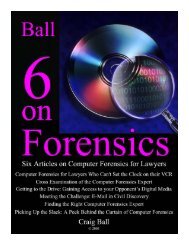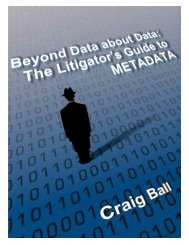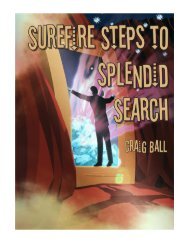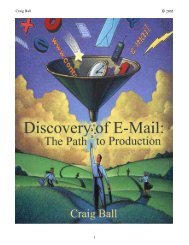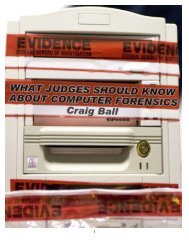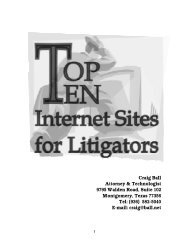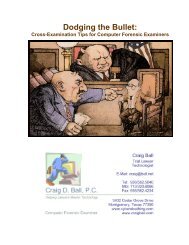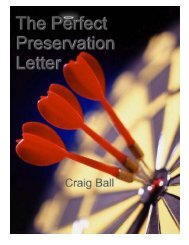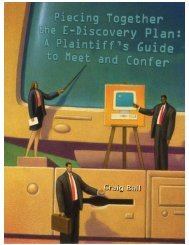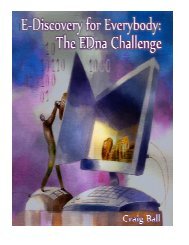Five on Forensics Page 1 - Craig Ball
Five on Forensics Page 1 - Craig Ball
Five on Forensics Page 1 - Craig Ball
You also want an ePaper? Increase the reach of your titles
YUMPU automatically turns print PDFs into web optimized ePapers that Google loves.
<str<strong>on</strong>g>Five</str<strong>on</strong>g> <strong>on</strong> <strong>Forensics</strong><br />
© 2002-2008 <strong>Craig</strong> <strong>Ball</strong> All Rights Reserved<br />
The Cops-and-Robbers Mindset<br />
The world of computer forensics is heavily populated by former law enforcement officers from<br />
the Secret Service, FBI, Treasury, military investigative offices and local police forces. Many<br />
of these veteran officers--though generally well trained and very capable--retain a good<br />
guy/bad guy mentality and some regard computer forensics as a secret society where they<br />
d<strong>on</strong>'t want the "bad guys" to know their secrets. Lawyers are seen as aiding the bad guys,<br />
and the very last thing forensic examiners want is for lawyers to understand the process well<br />
enough to c<strong>on</strong>duct an effective cross examinati<strong>on</strong>. With some justificati<strong>on</strong>, former cops view<br />
lawyers with suspici<strong>on</strong> and even disdain (how this makes them different from the rest of the<br />
world, I d<strong>on</strong>'t know). To their way of thinking, lawyers are c<strong>on</strong>temptuous of the truth and bent<br />
<strong>on</strong> sowing the seeds of distracti<strong>on</strong>, c<strong>on</strong>fusi<strong>on</strong> and doubt.<br />
This mindset can make forensic examiners guarded witnesses: not necessarily hostile, but<br />
reluctant, or quick to dive under cover of technical arcana and jarg<strong>on</strong> to shake off a pursuer.<br />
A forensic examiner is dealing with largely objective observati<strong>on</strong>s and shouldn’t come across<br />
as an advocate. If evasive or uncooperative <strong>on</strong> cross, give the witness enough rope for the<br />
jury to see it.<br />
Tool Tykes<br />
Poorly trained experts rely <strong>on</strong> software tools without fully understanding how they work.<br />
They’re Tool Tykes. Of course, all of us trust and swear by tools we d<strong>on</strong>'t fully understand--<br />
do you really fathom how a quartz wristwatch tells time or a mouse moves the cursor?—but,<br />
an expert should be able to explain how a tool performs its magic, not offer it up as a black<br />
box oracle. Tool Tykes are trained to dodge attacks <strong>on</strong> their lack of fundamental skills by<br />
resp<strong>on</strong>ding that, “The tool is not <strong>on</strong> trial” or citing how frequently the testim<strong>on</strong>y of other<br />
witnesses using the same tool has been accepted as evidence in other courts. D<strong>on</strong>'t let them<br />
get away with this evasi<strong>on</strong>. A great tool in unskilled hands is not reliable. Press the witness<br />
to either explain how the tool achieves its results or admit they d<strong>on</strong>'t know. Be advised that<br />
this technique will flush out <strong>on</strong>ly the pretenders to the thr<strong>on</strong>e of "expert." Real pros are going<br />
to know how their tools work down at the bit level and be able to explain it in a way any juror<br />
can grasp. Of course, you should be ready to distinguish the right explanati<strong>on</strong> from technical<br />
doubletalk.<br />
Computer forensics is a new discipline and many computer savvy pers<strong>on</strong>s without forensic<br />
training or experience offer their services as experts. Just as not every doctor is qualified as<br />
a cor<strong>on</strong>er, not every systems administrator is a forensics expert. A background in law, law<br />
enforcement or investigati<strong>on</strong> is important, whereas programming skills have little bearing <strong>on</strong><br />
computer forensic skills. Be certain to obtain the witness’ C.V. and check it for accuracy.<br />
Look for membership in professi<strong>on</strong>al associati<strong>on</strong>s of computer forensic examiners, formal<br />
training and certificati<strong>on</strong>. Find out if the witness has published articles <strong>on</strong> computer forensics<br />
or participated in public list serves supporting the discipline, then find and read those<br />
c<strong>on</strong>tributi<strong>on</strong>s to assess their expertise.<br />
Chain-of-Custody Issues<br />
Because of their law enforcement backgrounds, forensic experts tend to be very savvy about<br />
the importance of, and the proper procedures to maintain, a chain of custody. A chain of<br />
<strong>Page</strong> 82



